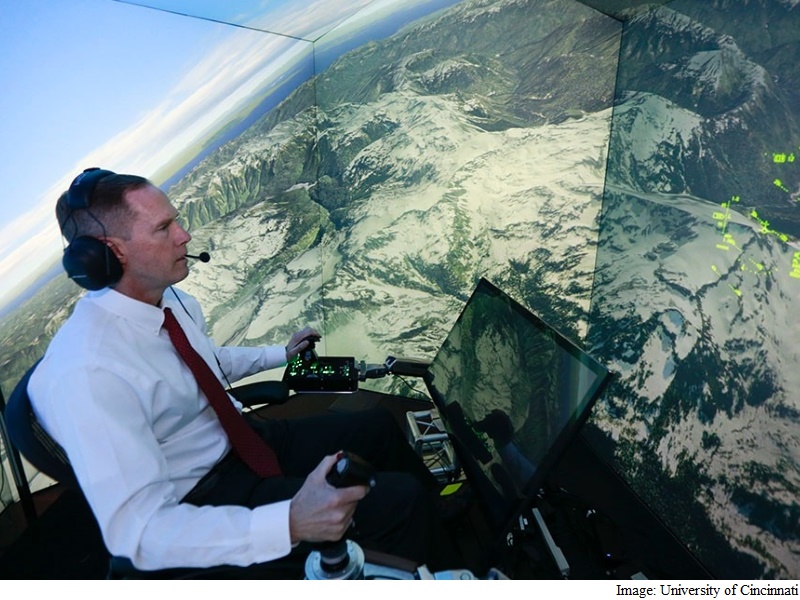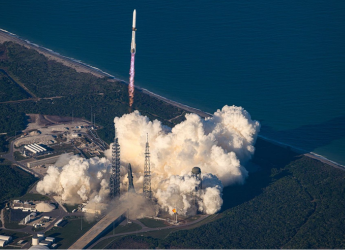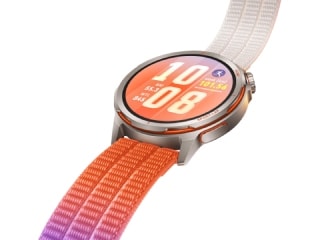- Home
- Science
- Science News
- New AI System Beats Human in Aerial Combat Simulation
New AI System Beats Human in Aerial Combat Simulation
By Press Trust of India | Updated: 28 June 2016 15:46 IST

Click Here to Add Gadgets360 As A Trusted Source

Advertisement
In a breakthrough, an artificial intelligence (AI) system has emerged victorious against a human expert during a high-fidelity air combat simulation.
The system developed at the University of Cincinnati in the US was assessed by subject-matter expert and retired US Air Force Colonel Gene Lee - who holds extensive aerial combat experience as an instructor and Air Battle Manager with considerable fighter aircraft expertise.
The AI, dubbed Alpha, is the most aggressive, responsive, dynamic and credible AI to date, according to Lee.
Alpha is a significant breakthrough in the application of what is called genetic-fuzzy systems, researchers said. The application is specifically designed for use with Unmanned Combat Aerial Vehicles (UCAVs) in simulated air-combat missions for research purposes.
In its earliest iterations, Alpha consistently outperformed a baseline computer programme previously used by the Air Force Research Lab for research. In other words, it defeated other AI opponents.
It was only after early iterations of Alpha bested other computer programme opponents that Lee then took to manual controls against a more mature version of Alpha in October last year.
Not only was Lee not able to score a kill against Alpha after repeated attempts, he was shot out of the air every time during protracted engagements in the simulator.
Since that first human vs Alpha encounter in the simulator, this AI has repeatedly bested other experts as well.
"I was surprised at how aware and reactive it was. It seemed to be aware of my intentions and reacting instantly to my changes in flight and my missile deployment," Lee said. "It knew how to defeat the shot I was taking. It moved instantly between defensive and offensive actions as needed," he added.
"Alpha is already a deadly opponent to face in these simulated environments. The goal is to continue developing Alpha, to push and extend its capabilities, and perform additional testing against other trained pilots," said Nick Ernest, who graduated from University of Cincinnati in 2015.
"Fidelity also needs to be increased, which will come in the form of even more realistic aerodynamic and sensor models," added Ernest who is now CEO at Psibernetix, the firm that created the Alpha project.
Alpha can take in the entirety of sensor data, organise it, create a complete mapping of a combat scenario and make or change combat decisions for a flight of four fighter aircraft in less than a millisecond, researchers said.
It is so fast that it could consider and coordinate the best tactical plan and precise responses, within a dynamic environment, over 250 times faster than Alpha's human opponents could blink, they said.
The research was published in the Journal of Defence Management.
The system developed at the University of Cincinnati in the US was assessed by subject-matter expert and retired US Air Force Colonel Gene Lee - who holds extensive aerial combat experience as an instructor and Air Battle Manager with considerable fighter aircraft expertise.
The AI, dubbed Alpha, is the most aggressive, responsive, dynamic and credible AI to date, according to Lee.
Alpha is a significant breakthrough in the application of what is called genetic-fuzzy systems, researchers said. The application is specifically designed for use with Unmanned Combat Aerial Vehicles (UCAVs) in simulated air-combat missions for research purposes.
In its earliest iterations, Alpha consistently outperformed a baseline computer programme previously used by the Air Force Research Lab for research. In other words, it defeated other AI opponents.
It was only after early iterations of Alpha bested other computer programme opponents that Lee then took to manual controls against a more mature version of Alpha in October last year.
Not only was Lee not able to score a kill against Alpha after repeated attempts, he was shot out of the air every time during protracted engagements in the simulator.
Since that first human vs Alpha encounter in the simulator, this AI has repeatedly bested other experts as well.
"I was surprised at how aware and reactive it was. It seemed to be aware of my intentions and reacting instantly to my changes in flight and my missile deployment," Lee said. "It knew how to defeat the shot I was taking. It moved instantly between defensive and offensive actions as needed," he added.
"Alpha is already a deadly opponent to face in these simulated environments. The goal is to continue developing Alpha, to push and extend its capabilities, and perform additional testing against other trained pilots," said Nick Ernest, who graduated from University of Cincinnati in 2015.
"Fidelity also needs to be increased, which will come in the form of even more realistic aerodynamic and sensor models," added Ernest who is now CEO at Psibernetix, the firm that created the Alpha project.
Alpha can take in the entirety of sensor data, organise it, create a complete mapping of a combat scenario and make or change combat decisions for a flight of four fighter aircraft in less than a millisecond, researchers said.
It is so fast that it could consider and coordinate the best tactical plan and precise responses, within a dynamic environment, over 250 times faster than Alpha's human opponents could blink, they said.
The research was published in the Journal of Defence Management.
Comments
Get your daily dose of tech news, reviews, and insights, in under 80 characters on Gadgets 360 Turbo. Connect with fellow tech lovers on our Forum. Follow us on X, Facebook, WhatsApp, Threads and Google News for instant updates. Catch all the action on our YouTube channel.
Related Stories
Popular on Gadgets
- Samsung Galaxy Unpacked 2026
- iPhone 17 Pro Max
- ChatGPT
- iOS 26
- Laptop Under 50000
- Smartwatch Under 10000
- Apple Vision Pro
- Oneplus 12
- OnePlus Nord CE 3 Lite 5G
- iPhone 13
- Xiaomi 14 Pro
- Oppo Find N3
- Tecno Spark Go (2023)
- Realme V30
- Best Phones Under 25000
- Samsung Galaxy S24 Series
- Cryptocurrency
- iQoo 12
- Samsung Galaxy S24 Ultra
- Giottus
- Samsung Galaxy Z Flip 5
- Apple 'Scary Fast'
- Housefull 5
- GoPro Hero 12 Black Review
- Invincible Season 2
- JioGlass
- HD Ready TV
- Latest Mobile Phones
- Compare Phones
Latest Gadgets
- Leica Leitzphone
- Samsung Galaxy S26+
- Samsung Galaxy S26 Ultra
- Samsung Galaxy S26
- iQOO 15R
- Realme P4 Lite
- Vivo V70
- Vivo V70 Elite
- Asus TUF Gaming A14 (2026)
- Asus ProArt GoPro Edition
- Huawei MatePad Mini
- Infinix Xpad 30E
- Huawei Watch GT Runner 2
- Amazfit Active 3 Premium
- Xiaomi QLED TV X Pro 75
- Haier H5E Series
- Asus ROG Ally
- Nintendo Switch Lite
- Haier 1.6 Ton 5 Star Inverter Split AC (HSU19G-MZAID5BN-INV)
- Haier 1.6 Ton 5 Star Inverter Split AC (HSU19G-MZAIM5BN-INV)
© Copyright Red Pixels Ventures Limited 2026. All rights reserved.

















